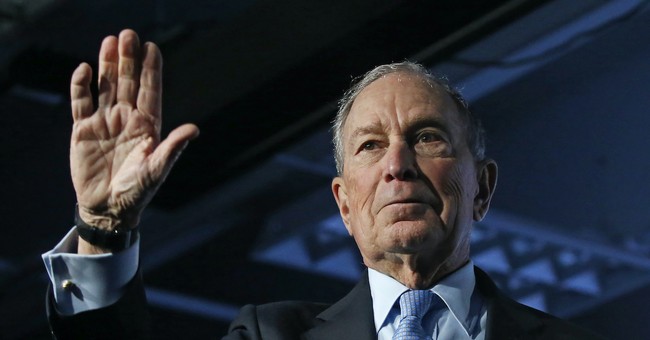
Democratic presidential candidate and former New York City Mayor Mike Bloomberg waves after speaking at a campaign event, Thursday, Feb. 20, 2020, in Salt Lake City. (AP Photo/Rick Bowmer)
After a 2012 report into the accumulation of wealth among China’s “ruling classes” he’d worked on won major awards, one would assume that journalist Mike Forsythe’s then-employer, Bloomberg News, was very happy with him and his work.
Perhaps they were for a short time, but within 18 months Forsythe and his collaborators were bounced from the company and forced to sign non-disclosure agreements. Corporate lawyers even harassed Forsythe’s wife, a reporter who worked for Voice of America in China, pressuring her to sign an NDA.
After the report was published in June 2012 Forsythe received death threats, and he and his wife were relocated to Hong Kong at the company’s expense. Forsythe’s wife, Leta Hong Fincher, shared “the rest of the story” with NPR:
Even so, the reporting team pursued the next chapter, focusing on Chinese leaders’ ties to the country’s richest man, Wang Jianlin. Among those in the reporters’ sights: the family of new Chinese President Xi Jinping. The story gained steam throughout 2013.
In emails sent back to Bloomberg’s journalists in China seen by Fincher, senior news editors in New York City expressed excitement.
And then: radio silence from headquarters. That story never ran.
“Mike and some of the other reporters and editors who had been working on this story just were asking for answers about … why was this story killed?” Fincher says.
Bloomberg News had run Forsythe’s 2012 story against the “advice” of Chinese government officials, but by 2013 editors were too afraid of losing money to call out the corruption. NPR obtained audio from an October 2013 private conference call between editor-in-chief Matthew Winkler, the China-based team, and senior news executives in New York.
Listen to Winkler’s comments here:
Winkler said:
“It is for sure going to, you know, invite the Communist Party to, you know, completely shut us down and kick us out of the country,” Winkler said. “So, I just don’t see that as a story that is justified. The inference is going to be interpreted by the government there as we are judging them. And they will probably kick us out of the country. They’ll probably shut us down, is my guess.”
Well, they’re not wrong; we are judging them.
Winkler was hesitant to publish another investigation because of the potential consequences, but tried to find a “Bloomberg” way to cover the story:
“It has to be done with a strategic framework and a tactical method that is … smart enough to allow us to continue and not run afoul of the Nazis who are in front of us and behind us everywhere,” Winkler said, according to the audio reviewed by NPR and verified by others. “And that’s who they are. And we should have no illusions about it.
“There’s a way to use the information you have in such a way that enables us to report, but not kill ourselves in the process and wipe out everything we’ve tried to build there.”
It wasn’t the news business that Bloomberg was primarily worried about; it was the terminals, which are the foundation of Michael Bloomberg’s personal fortune. According to NPR, subscribers pay $20,000 a year per terminal and receive specialized financial data and analysis.
“After the first investigative project ran in 2012, the Chinese authorities had searched Bloomberg’s news bureaus, delayed visas for reporters and ordered state-owned companies not to sign new leases for Bloomberg’s primary product: its terminals.
“If Bloomberg makes its money on terminals, it gains prestige and greater name recognition from its news division. Many of its stories, predominantly on business and finance, appear first on the terminal.”
A few weeks after that phone call, the New York Times published a piece headlined “Bloomberg News Is Said to Curb Articles That Might Anger China,” referencing the October call. Winkler denied that the stories had been spiked, which was clearly not true. Then-Mayor Bloomberg, who was allegedly not involved in his businesses at the time, declared in a press conference:
“I did read the article. It also pointed out that Bloomberg [News] did not do that. The editors said that was just not the case. Nobody thinks we are wusses and not willing to stand up and write stories that are of interest to the public and that are factually correct.”
After the Times piece, Forsythe was suspended from the company. He was eventually fired, and the other members of the China team are no longer employed by Bloomberg News either. The story Forsythe had been working on was eventually published by the Times, where Forsythe landed a job.
While Forsythe declined to speak to NPR about their story because of the NDA he signed, his wife shared what happened next:
They threatened to force Forsythe and Fincher to pay back the tens of thousands of dollars spent to move their family to Hong Kong after the death threats. Bloomberg also threatened to sue to make the couple pay the company’s legal costs, pushing the dollar amount well into the six figures.
“There was no reason why I should have to sign a nondisclosure agreement,” Fincher tells NPR, “because I didn’t possess any damaging material about the company.”
She recalls staring at a giant projection of Bloomberg’s outside lawyer from New York City on a video screen. He rejected her assurances that she did not pose any threat, demanding a formal nondisclosure agreement by asking, “What about all the evidence that’s in her head?”
Fincher walked out of the Bloomberg offices after refusing to sign the NDA. Bloomberg LP continued to approach and pressure her and only relented after she hired the same law team that had represented Edward Snowden.
What else is being covered up by Bloomberg LP’s NDA’s?















Join the conversation as a VIP Member